“The only thing I’ve won before was a wee scratch event in Ireland. I’m just relieved I managed to keep my head together.”
The reaction of a 24-year old Conor O’Rourke to his St. Andrews Trophy win in 2016 that, amongst other things, gave him the belief that his game was good enough to turn professional.
“I didn’t use the word ‘wee’ though,” he assures me, “that’s a word I’d never come out with! The rest of it is true though.”
Indeed, when I put it to O’Rourke that he might have been a bit of a late bloomer when it came to golf, “big time!” was the unequivocal response as he laughed at the notion that he could be portrayed as anything else. In fact, it wasn’t until the Kildare man was awarded a scholarship at Maynooth University that he decided to park his football and hurling aspirations to focus on golf. Yet, however late a transition it proved by modern standards, he wouldn’t trade his path to the pro ranks for anything in the world now.
A product of Gavin Lunny’s tutelage at Naas golf club, Conor O’Rourke is a 27-year old professional golfer disinterested in the prodigious titles that perhaps passed him by. Instead, you’d swear he had Eckhart Tolle whispering in his ear about the power of now because after that big win in Scotland in 2016, O’Rourke gained encouragement from a series of stepping stones that provided the appropriate amount of validation to do something he always had in the back of his mind; becoming a professional golfer.
“If I felt that I was improving at a rate where it was worth my while then I always wanted to turn professional,” he confirms. “Little things like the St. Andrews Trophy certainly backed up that idea along the way. It showed me that I can win tournaments when things work correctly and that has to give you confidence.”
Given that it was by far and away the biggest amateur title he had claimed, how did he manage to ‘keep his head together’ to pull off the coup?
“A few weeks before that was the Irish Amateur and I did a session with Gavin where we worked on a couple of mental tricks that we hadn’t been through before,” he recalls. “I shot 69 that final round and got a bit of a spark going and then I went to the French Amateur and same thing again, I got on a bit of a run.
“When you look at it with hindsight, I had good form building towards Scotland and when you’re playing well, you don’t get nervous. Yeah you’re a little bit anxious but everyone is and if you’re not you probably don’t want to be there anyway.”
Ranked 1,245th in the world of amateur golf, O’Rourke’s wire to wire win at the home of golf paved the way for him to turn his attention to the paid ranks, but in keeping with his patient plotting through the amateur circuit to that point, that move didn’t eventuate for another 15 months after that. But why the delay?
“If you’re a Rory and you’re 16 and you turn pro then there’s no question about it, but I don’t see the point in turning pro just to turn pro when you’re 19, 20. For me, I stayed amateur a little longer because there were things I wanted to prove to myself – things like playing for Ireland, pushing hard for Walker Cup. It was never an age thing.
“I did think strongly about turning pro the year before and I had a lot of really good conversations with Gavin and we agreed that it wasn’t quite the best thing at the time. Yeah, it was tough to put the brakes on. I remember being pretty headstrong with what I wanted to do but I’ve always had such trust in what Gavin says to me that I just had to take his advice – he tends to know what he’s talking about so I just went with it!”
By biding his time, the first tournament up for the fledgling pro happened to be the Irish Challenge at Mount Wolseley in September 2017. As far as convenient debuts go, it didn’t get much better.
“It was the dream place to play my first event,” he remembers. “And it was an instant learning curve. That event was me bringing the same amateur attitude to pro golf which is the whole thing of level par being a good number. Just doing enough, playing safe, not trying to push things and go for shots.
“The main thing I’ve learned in the professional game since then is that you must be aggressive. You have to completely back yourself and go for everything within reason because someone’s doing it every day and it’s paying off for them. If you’re shooting your level pars, it’s not going to be worth a whole lot to you in pro golf, apart from maybe the British Open,” he laughs.
“I can’t remember exactly the score I shot the first day,” 74 I remind him, “but it didn’t put me out of it. Second day at the par-5 10th I went for it but I hit an awful shot into the hazard. It was a shot I never would have taken on but the fact that I took it on and made an arse of it didn’t really matter.
“My only approach from then on was about getting comfortable taking on shots that I normally wouldn’t. The only way you’re going to win out here is by keeping the foot down big time.”
It proved a swift lesson and O’Rourke’s ascent through the professional game since has been primarily focussed on his Alps Tour commitments. Although he displayed plenty of promise with four top-10 finishes that included a runner-up spot at the Alps de Las Castillas in his rookie season on the satellite circuit last year, his few ventures into Challenge Tour company in 2018 provided another telling education for the budding Kildare pro.
“Starting out on the Challenge Tour I got caught again because I was a little bit comfortable playing at Alps level,” he confesses having missed the cut in three of five Challenge Tour starts last year.
“Having had success here and there on Alps,” he fell just shy of a top-5 finish on the Order of Merit that would have secured his Challenge Tour card for this season, “I didn’t approach the Challenge Tour with the right attitude. The way I’m going to approach the events I play in this year is with absolute aggression. It’s not the tour I’m going to be playing on – I didn’t get my full tour card last year – so given my few starts I may as well go for it.”
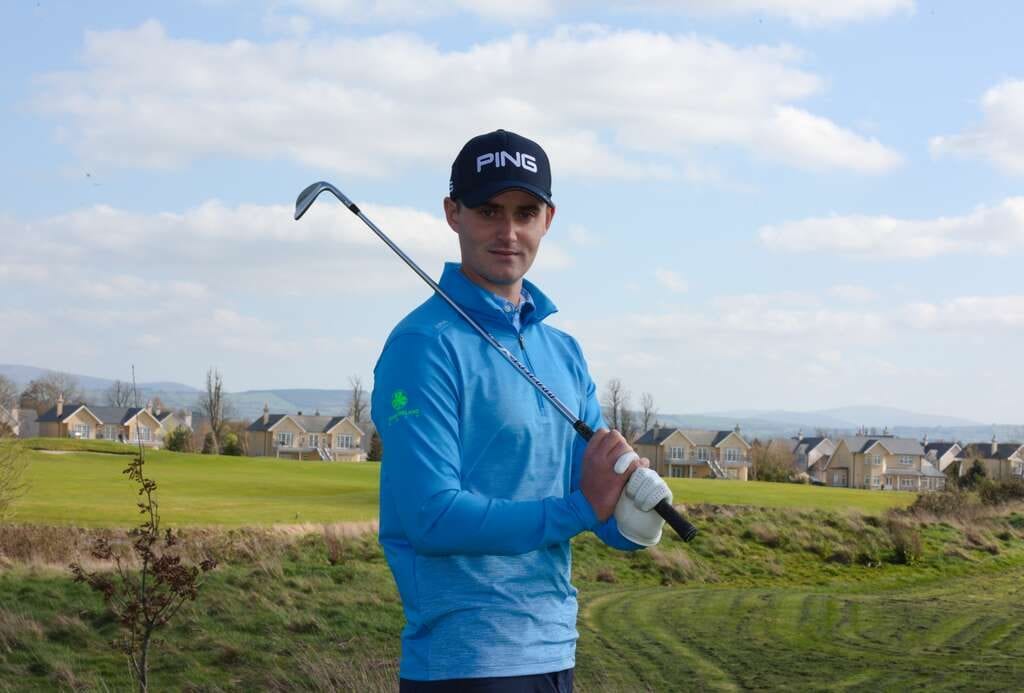
Having swallowed a shock to the system in terms of the climb from amateur golf to the pro game, it was beginning to sound like the jump again from Alps Tour to Challenge Tour was proving just as significant, or was I being led astray?
“I have my own slant on this. I think in order to win not really,” he says of the differences between the two circuits. “I think to compete, to get over the line of making cuts in Alps versus Challenge, it’s a completely different game. It’s so condensed at the top of a Challenge Tour field so if your sole focus is to make a cut, then it’s a lot easier to do it at Alps level than any other satellite tour.
“Then again, if you’re playing an Alps Tour course that maybe plays a fraction easier – if you’re 10-under after two rounds or 12-under after two rounds, then boys aren’t going to go a whole lot lower than that no matter where you are. 20-under for four rounds is 20-under for four rounds so if you’re playing great, I think you can win as easy on the Challenge Tour as you can do on Alps.”
O’Rourke’s adopted mindset of absolute aggression has been made all the easier to implement given the top-heavy prize funds that are part and parcel of playing satellite tour golf. Indeed, O’Rourke believes that if you were to start a final round in 20th place and finish 30th, a probable loss of around 60 euro makes going out and “throwing caution to the wind a complete no brainer”.
However, just then he checks himself. The business man clicks into gear. “The smallest money can make the biggest difference,” he reminds me, or is he talking to himself?
It comes as no surprise that the 27-year old has a mass on money where some fresher faces he plays alongside still believe it grows on trees. It’s a calculated approach for O’Rourke whose sponsors can rest assured that their generosity will never go unappreciated. But their support is not simply about financial gain for the Naas man. Of course, it’s important but it’s the vote of confidence that others might overlook that means so much to the humble Lily White.
“If there’s people who are successful in business in their own right, in turn showing confidence in you, then that can only be a positive. For me, I feel like I’m representing them and the fact that they’re investing in me, I want to represent them well. When I’m playing it’s not on my mind but it’s a nice little reward when you’re playing well to give those people who are helping you out an acknowledgement and a little plug here and there.
“While I play, I try to get so far away from that but I’m well aware of what’s happening behind the scenes. I’m 27, it’s not like I’m 19, I’ve just turned pro and I want to have fun with it. Yeah I want to have a lot of fun with it but it’s my job and it’s my profession and I want to keep things moving in the right direction to make it last as long as possible.”
But how then, with the cloud of knowing exactly what he needs to break even hanging over his head, can Conor the golfer cast the businessman aside in order to focus on compiling numbers on his scorecard as opposed to getting weighed down by those lurking in his bank balance?
“I put all my eggs in the preparation basket,” he admits. “I prepare as well as I can and as smart as I can and on the day I go to play, I just try and trust it. You’ve done the work, if it doesn’t work this week it will work next week and if not then, it will definitely click pretty soon.
“So, if I go through a little barren spell, it doesn’t get me down as much as it might other people because I have faith that if I keep doing the right things and ticking the right boxes, that things will eventually come good. It just comes down to having the patience to keep putting the work in but I don’t mind that end of it because I know the rewards will come eventually.”
What he wasn’t expecting to arrive so soon was a debilitating wrist injury that has plagued his pre-season preparation over the past number of weeks. Availing of the warm weather golf offering of the Mediterranean Tour, the Naas man held top spot after a blistering 62 in the penultimate round of event 3 in February despite a niggling pain in his hand. A day later and with the pain only worsening, he was on a flight home, resigned to missing the opening swing of the Alps Tour as a result.
“I had a really, really good pre-season. I did some brilliant work with Julia Carroll, Gavin’s wife on my fitness and saw some great progress. Brian Feeney had my putting in great shape leading up to Egypt as well and although I got there and was slightly performance rusty, I wasn’t worried about that. The Med Tour’s a great way to get playing early in the year and I played myself into some nice form but hurt my wrist a little bit. I kept playing thinking it might just go away but then it completely flared up on me.
“It’s a strange one. It’s had me out of action for the last five or six weeks but I think it’s much closer now and I’m looking forward to getting back at it. It’s just one of those things; a setback but look, there might be a reason for it so you wouldn’t know. I’ll be fresh once I get back and I’ll definitely be hungry.”
It’s this sense of perspective and clarity in his outlook despite a speed bump or two along the way that struck me as being most impressive when chatting to Conor. And I wondered before our time came to an end of how the man I spoke to on the phone that day would compare to the starry-eyed professional who entered the gates of Mount Wolseley in September 2017 suddenly playing for cash instead of vouchers.
“Better,” he chuckled. “A lot better… thankfully, or else I’d be going very hungry!
“I’ve made huge improvements in my game technically, but more so mentally. It comes back to trying to get more comfortable with being aggressive, that’s something I still have to work on because I think playing golf in Ireland or the UK, you’re brought up to keep the ball in play, be safe, not to do anything crazy bad. Par is your friend. Because it tends to be so hard to win championships in Ireland, I think the tendency is always to fall back to that, it’s what comes naturally, but for me that’s not where I want to be. I’m trying to drive away from that as much as I can and I’ll just continue being aggressive.
“Getting over the line out here, the only way to do it is bashing the line out of it! It won’t be handed to you no matter what level you’re playing at. Hopefully I can get myself into position a few times this year and take my own advice when I get there.”

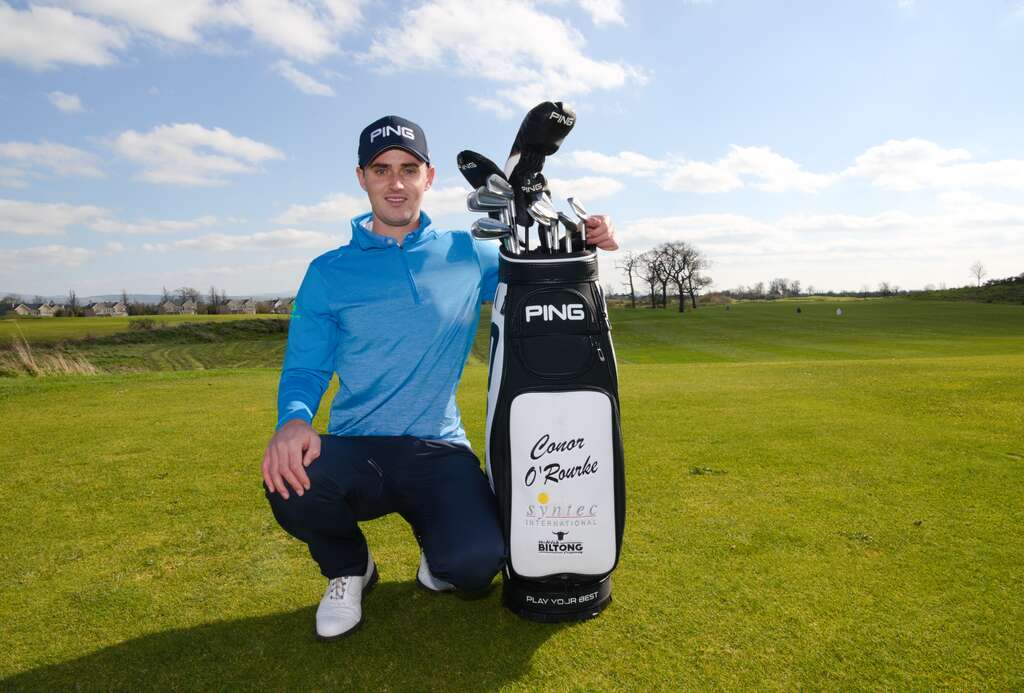






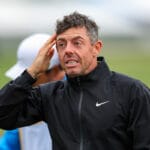







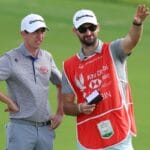


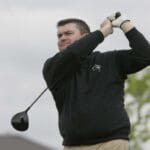



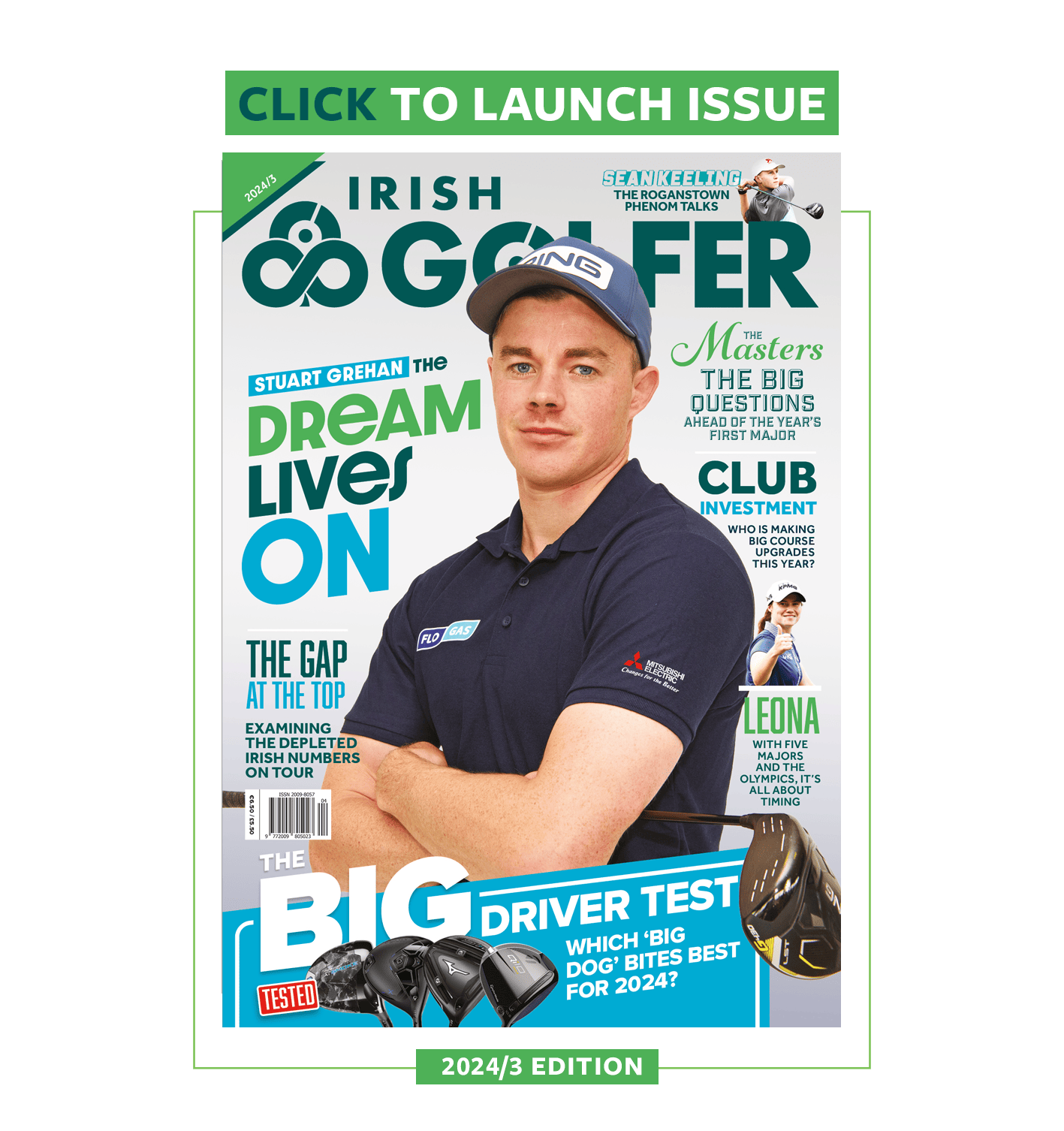
Leave a comment